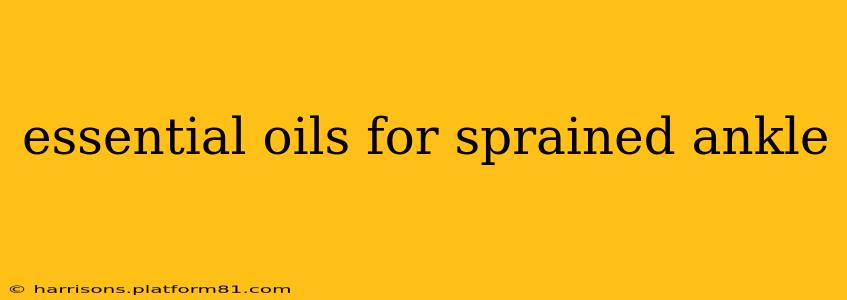A sprained ankle, characterized by stretched or torn ligaments, is a common injury causing pain, swelling, and limited mobility. While medical attention is crucial for severe sprains, essential oils can offer a complementary approach to manage symptoms and promote healing. This article explores the potential benefits of specific essential oils for sprained ankles, addressing common questions and concerns.
Understanding Sprained Ankles:
Before diving into essential oil applications, it’s important to understand the different grades of ankle sprains. Mild sprains involve minor ligament stretching, while moderate sprains involve partial tears, and severe sprains result in complete ligament tears. Always consult a doctor for diagnosis and treatment, especially for moderate to severe sprains. Essential oils are not a replacement for medical care but can be a valuable addition to a comprehensive treatment plan.
What Essential Oils Are Good for Ankle Sprains?
Several essential oils possess anti-inflammatory, analgesic (pain-relieving), and antiseptic properties that may benefit sprained ankles. These include:
-
Lavender: Known for its calming and soothing properties, lavender oil can help reduce pain and inflammation. Its relaxing aroma can also promote better sleep, crucial for recovery.
-
Peppermint: Peppermint oil's cooling effect can provide temporary relief from pain and swelling. Its menthol content helps to numb the affected area.
-
Rosemary: This oil is often praised for its anti-inflammatory and analgesic qualities, potentially aiding in reducing pain and swelling associated with a sprained ankle.
-
Helichrysum: This powerful oil is frequently lauded for its remarkable anti-inflammatory and anti-scarring properties, making it a valuable addition to a sprained ankle recovery regimen. It may assist in reducing inflammation and promoting faster healing.
-
Tea Tree: With its well-known antiseptic properties, tea tree oil can help prevent infection, a potential complication of a sprained ankle, particularly if the skin is broken.
How to Use Essential Oils for a Sprained Ankle?
Essential oils are highly concentrated and should never be applied directly to the skin. They must always be diluted with a carrier oil, such as coconut oil, jojoba oil, or almond oil. A general guideline is to use a ratio of 1-3% essential oil to carrier oil (e.g., 2-6 drops of essential oil per 1 tablespoon of carrier oil).
Here are some common application methods:
-
Massage: Gently massage the diluted essential oil blend onto the affected area, avoiding direct pressure on the injured ligaments.
-
Compresses: Soak a clean cloth in the diluted oil blend and apply it to the sprained ankle as a compress.
-
Inhalation: Inhaling the aroma of these oils (using a diffuser or simply placing a few drops on a tissue) may help to reduce pain and promote relaxation.
Can Essential Oils Help Reduce Swelling?
Yes, certain essential oils, like lavender, peppermint, and helichrysum, possess anti-inflammatory properties that may help to reduce swelling. However, it's crucial to remember that these oils are complementary therapies and should not replace standard medical treatments for swelling reduction, such as elevation, ice, and compression.
What Are the Risks of Using Essential Oils on a Sprained Ankle?
While generally safe when used properly, essential oils can cause allergic reactions in some individuals. Always perform a patch test before applying any essential oil blend to a large area of skin. Dilute the oil thoroughly, and if any irritation or allergic reaction occurs, discontinue use immediately. Pregnant or breastfeeding women should consult their doctor before using essential oils.
How Long Does It Take for Essential Oils to Work?
The effects of essential oils can vary depending on the individual, the severity of the sprain, and the specific oils used. Some individuals may experience immediate relief from pain and inflammation, while others may notice a gradual improvement over time.
Are There Any Other Treatments I Should Combine with Essential Oils?
Essential oils should be considered part of a holistic approach to sprained ankle treatment. It's essential to follow your doctor's recommendations for treatment, which may include RICE (Rest, Ice, Compression, Elevation) therapy, pain medication, and physical therapy. Essential oils can complement these treatments, not replace them.
Disclaimer: This information is for educational purposes only and is not intended as medical advice. Always consult a healthcare professional for any health concerns or before making any decisions related to your health or treatment. The effectiveness of essential oils varies from person to person.
